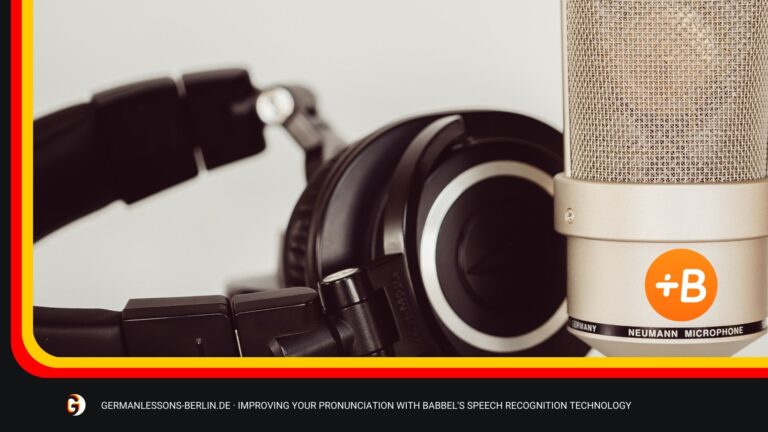Do you feel intimidated by the thought of speaking German confidently even though you’re a beginner? You’re not alone! Many language learners struggle with this, but it doesn’t have to be that way. With the right mindset and approach, you can start speaking German confidently in no time. In this article, I will show you how to build your confidence when learning German so that you can communicate effectively with native speakers like a pro.
Are you ready for an adventure? Learning a second language is just that – an exciting journey full of new discoveries along the way. It may seem daunting at first, especially if you’ve never spoken another language before, but don’t let fear stop you from achieving your goal of becoming fluent in German. With some practice and dedication, anyone can become more confident while speaking German.
So what are some tips on building your confidence when learning German? Keep reading to find out! Here I will cover practical techniques such as staying positive, immersing yourself in the culture and setting realistic goals – all which together make up the recipe for success when it comes to speaking any foreign language confidently.
Table of Contents
Learn The Basics
Learning the basics of German may seem like an intimidating endeavor, but with some dedication and a bit of patience, it can be quite achievable. To start off, familiarize yourself with the structure of the language by studying its grammar rules. This is perhaps one of the most important steps to take in learning any foreign language. Learning basic sentence structures such as subject-verb agreement and noun-adjective order will go a long way in helping you master German grammar quickly. Additionally, get comfortable with frequently used words and phrases that can help you form sentences more naturally when speaking or writing in German.
Once these essential components are under your belt, focus on building up your vocabulary so you can express yourself more clearly when having conversations in German. Start with simple everyday words; this will give you confidence to move onto more complex topics without feeling overwhelmed. Finally, practice what you’ve learned by talking to native speakers or joining online communities for German learners – this will not only increase your confidence but also help keep track of how much progress you have made! With all these things in mind, let’s explore essential German vocabulary next.
Essential German Vocabulary
Learning essential German vocabulary is the first step to confidently speaking German. Start by studying a basic German words list and familiarizing yourself with common German language terms. With a little practice, you’ll soon be able to have simple conversations in no time!
When building your German vocabulary list, start with the most commonly used words like greetings and introductions. Become comfortable saying “Hallo” (Hello) or “Guten Tag” (Good day). These are two of the most important phrases for everyday conversations when speaking German. Additionally, learn how to say “Ja” (Yes), “Nein” (No), and “Bitte” (Please). Knowing these three will help you form complete sentences.
Once you become more confident using daily conversational phrases, focus on other important aspects such as numbers, colors, days of the week, months of the year, animals, food items etc… You can also add slang words that native speakers use which may not appear on any official german vocabulary list. The key is finding something that works best for you and practicing it until it becomes natural to you.
By understanding some essential German terminology now, you’ll feel much more prepared when having real-life interactions with native speakers. Next up we look at how to use these new words in everyday conversations so stay tuned!
Phrases For Everyday Conversations
Did you know that over 90 million people in the world speak German? If you’re a beginner, it can feel intimidating to start speaking confidently. But there are some easy ways to get comfortable with conversational German! Let’s take a look at some everyday expressions and small talk topics that will help you out:
- Basic Questions: Die Frage nach dem Namen (What’s your name?), Woher kommst du? (Where do you come from?), Was machst du gerade? (What are you doing right now?)
- Everyday Conversations: Wie war dein Tag heute? (How was your day today?), Hast du Lust auf etwas zu unternehmen? (Do you feel like doing something?), Kann ich dir helfen? (Can I help?)
- Small Talk Topics: Welches Fach magst du am liebsten? (Which subject do you like best?), Welches ist deine Lieblingsserie im Fernsehen/im Kino? (Which one is your favorite TV show/movie?), Magst du Sportspiele spielen? (Do you like playing sports games?).
These phrases should give you plenty of material for everyday conversations. While mastering conversational German may seem daunting, keep in mind that with practice comes confidence. And once you’ve got the basics down, improving your pronunciation will become easier!
Improving Your Pronunciation
When it comes to speaking German confidently, improving your pronunciation is key. To speak with a perfect German accent, you will need to learn the unique sounds of the language and practice them until they become second nature. It can be intimidating for beginners to master pronunciations that are foreign to their ears, but with dedication and hard work, you can achieve success.
The first step in improving your pronunciation is to get familiar with how words sound when spoken by native speakers. Find videos of people speaking German online or watch movies and TV shows in the language. Listen carefully as they pronounce each word and try to mimic the same sound yourself. You should also pay attention to syllable stress and intonation patterns; these are important components of correct pronunciation.
In addition, consider enrolling in a class or working with a tutor who has experience teaching German pronunciation. They can help you identify common mistakes and give you personalized feedback on areas where improvement is needed. A good practice exercise is repeating phrases out loud while focusing on enunciating every single letter correctly – this helps train your mouth muscles so that producing accurate sounds becomes easier over time.
Once you have mastered the basics of pronunciation, focus on building up your confidence through regular conversation practice with others who also speak German. Try roleplaying different scenarios such as ordering food at a restaurant or introducing yourself at an event – this will sharpen your skills even further and enable you to communicate effectively in any situation!
Building Your Confidence
Confidence is the building block for success, particularly when it comes to mastering a new language. As a beginner learning German, you may be feeling intimidated and uncertain about your ability to understand and speak with confidence. However, there are some simple steps that can help you build up your confidence in speaking German.
The first step towards gaining more confidence in speaking German is to have realistic expectations. It’s important not to expect yourself to become fluent overnight – remember, even native speakers make mistakes! Instead of focusing on perfectionism, focus on small wins such as correctly pronouncing words or understanding basic sentences.
| Unfamiliar Words | New Vocabulary | Correct Sentences |
| Feeling scared | Neue Wörter | Richtige Sätze |
| Unsure | Vokabeln | Korrekte Sätze |
| Intimidated | Verstehen der Grammatik |
This table illustrates how a beginner should approach each milestone during their journey of learning German: by breaking down large tasks into smaller ones and being mindful of the progress they’ve made so far rather than dwelling too much on where they want to be. This will enable them to stay motivated and gain more confidence over time.
Another way of building your confidence in speaking German is through practice conversations with friends or other learners who share similar goals. Don’t worry if you don’t feel comfortable having long conversations right away – start off slowly by exchanging short phrases or talking about topics that interest both parties. You’ll soon find that regular conversations give you more opportunities to learn new vocabulary and phrases while developing greater familiarity with the language itself.
Immersion Techniques
Immersion is one of the best ways to learn a language and for German, it can be an incredibly rewarding experience. With immersive learning, you get to immerse yourself in the culture of Germany while also gaining fluency in the language. Here are some great immersion techniques that will help you become more confident when speaking German:
- Go on a trip to Germany or another German-speaking country – this is probably the most effective way to become fluent in any language. It gives you first-hand exposure to native speakers and their environment. Plus, if you stay for longer periods of time, you’ll be able to pick up on nuances and cultural references much faster than if you were just studying with books or apps.
- Find a conversation partner who speaks German – nothing beats talking with someone who knows the language well. Have them correct your mistakes, give feedback on how things sound, and even offer tips on expressions they use daily (which may not appear in textbooks). This could be as simple as finding an exchange student in your area or joining online groups dedicated to language practice.
- Listen to podcasts or watch TV shows/movies in German – audio/visual material like these can really bring the language alive for learners! Try watching popular films from Germany with subtitles both in English and German so that you can follow along more easily. You can also listen to radio programs or conversations between people discussing topics related to everyday life in Germany. Doing this regularly will make it easier for new words and phrases to stick with you over time.
- Take part in activities around town – many cities have “language cafes” where people come together to socialize while practicing foreign languages such as German. If there isn’t one near you, consider hosting one at your own home! Invite friends who might speak some level of German already or find others looking for someone else willing to teach them what they know about the language.
Doing all these things will definitely help improve your confidence when speaking German but don’t forget that practice makes perfect! The next step is finding resources and apps available online that allow you access different types of content like videos, exercises, quizzes etc., which will help hone your skills further and keep track of your progress too!
Online Resources And Apps To Help You Practice
Practicing your German skills can be a daunting task, especially if you’re just starting out. But with the help of online resources and apps, it’s possible to learn German in no time! With countless free lessons and language-learning tools available on the internet, there’s something for every learner. From podcasts and interactive quizzes to immersive video courses and audio books, these online German practice materials will give you an edge when learning the language.
For those looking to take their German studies mobile, there are plenty of great language-learning apps available as well. Whether you want to brush up on some basic grammar or hone your conversational skills, there are dozens of german language apps designed specifically for learners like you. Many of them even offer gamified experiences that make learning enjoyable and memorable – perfect for busy students who don’t have much extra time.
In addition to dedicated language-learning websites and apps, there are also tons of helpful german language resources scattered throughout the web. Websites like Duolingo offer free courses tailored specifically towards beginner learners while sites like The Lingostore provide access to thousands of hours worth of content from native speakers. And if all else fails, YouTube is always a reliable source for finding high quality yet accessible tutorials about complex topics related to learning German online.
With so many different options at your disposal, getting started with speaking German confidently doesn’t have to be intimidating anymore! All it takes is a bit of dedication and patience – plus some creativity – and before long you’ll be conquering those tricky words and phrases with ease.
Tips For Remembering German Words And Phrases
Now that you’ve explored some online resources and apps to help practice German, let’s look at strategies for remembering German words and phrases. Memorization is a major part of learning any language, but it doesn’t have to be difficult! Here are some tips to help make the process easier.
First, try using mnemonics. This technique involves creating mental shortcuts or associations in order to remember information more easily. For example, if you want to remember the word “schlafen” which means “to sleep,” think of something like: I always sch-LAFE when tired (the extra ‘f’ makes it easier to recall). Or if you’re trying to remember the phrase “Das Auto fährt” which means “The car drives,” think of DA-s A(u)-uto FAERHT fast down the highway. These visual cues can help strengthen your memory connections so it’s much easier to access them later on.
Another useful tip is repetition. If you hear or say a word or phrase multiple times, it will become ingrained in your brain faster than one time only. Try repeating aloud words and phrases as soon as they come up in conversation, no matter how awkward it may feel initially – with enough practice, this will become second nature! Additionally, keep flashcards around with common german words written on them; pull out these cards several times throughout the day and test yourself by reading them out loud until each one sticks.
By implementing these memorization techniques into your daily language routine, you’ll find that speaking confidently in German becomes simpler over time! In the next section we’ll explore ways improve fluency even further.
Strategies To Improve Fluency
Learning to speak German confidently is an achievable goal, even for the beginner. To help get you there, here are some strategies that will improve your fluency:
| Strategy | Result |
| Listen | Develops familiarity with pronunciation |
| Speak | Improves confidence |
| Write | Enhances understanding of language |
| Read | Strengthens comprehension |
Listening and speaking in German can be intimidating at first, but it’s important to remember that practice makes perfect! Start small by listening to podcasts or watching videos in German. This familiarizes you with the sounds of the language and helps you recognize useful words and phrases. Then try reading aloud from a book or other text written in German. You don’t need to understand every word; just focus on pronouncing them correctly. Finally, take any opportunity you can find to converse with native speakers – whether online or offline. Communicating directly with someone who speaks the language daily builds your confidence and gives valuable feedback about how well you communicate. With these strategies combined, you’ll soon start seeing improvement in your ability to use the German language fluently!
How To Interact With Native Speakers
Interacting with native speakers of German can be an incredibly rewarding experience. It’s a great way to gain confidence in speaking the language, as well as learn about local culture and customs. Here are some tips for engaging in conversations with native speakers:
- Make sure you have enough knowledge of grammar and vocabulary to carry on basic conversations. If necessary, review your materials before meeting someone or find online resources to help brush up your skills quickly.
- Start small by introducing yourself and asking simple questions like “What’s your name?” or “Where do you come from?” This will give you practice forming sentences without overwhelming yourself.
- Don’t be afraid to make mistakes! Native speakers understand that learning a new language is difficult and they may even offer helpful advice if you ask them politely. To really excel at conversing in German, it’s important to remain engaged while interacting with native speakers. Take advantage of every opportunity available – join clubs, attend events, or simply chat with people around town. Additionally, consider subscribing to magazines or newspapers written in German for continued exposure to the language. With these steps, you’ll soon feel confident when speaking German with natives!
Frequently Asked Questions
What Are The Best Methods For Memorizing German Words And Phrases?
Memorizing foreign language words and phrases can be intimidating for beginner learners. But with the right memorization techniques, it doesn’t have to be a daunting task. Learning German words and phrases is an essential part of mastering the language so you can speak confidently even if you’re just starting out. In this article, I’ll discuss some of the best methods for memorizing German words and phrases.
One effective technique is using flashcards. Flashcards are great because they allow you to break down large pieces of information into smaller parts, making them easier to remember. When creating flashcards, make sure to include both English and German translations and use visuals whenever possible to help enhance your memory. You can also create stories or associations between different cards that will help you recall them more easily when speaking in German.
Another good method for learningGerman vocabulary and grammar is through repetition. Repeating new words over and over again will help ingrain them in your mind, allowing you to quickly recall them during conversations in German. Additionally, utilizing audio recordings such as free podcasts or audiobooks can provide additional practice opportunities while helping build up your confidence in speaking the language.
No matter which method you choose, consistency is key when learning any language – especially German! Make sure to set aside time each day to devote to studying; even five minutes here and there adds up over time! With dedication and practice, you’ll soon find yourself able to communicate fluently in no time at all.
How Can I Practice Speaking German With Native Speakers?
I’m sure you’ve heard the phrase, “practice makes perfect.” When it comes to learning German, this saying couldn’t be more true. The best way to get better at speaking and understanding the language is by practicing with native speakers. But how can one find native speakers for practice conversations? Here are a few ways I recommend:
Online Communities – You can join various online communities dedicated to helping people learn German. These communities usually have forums where members can post looking for partners to practice their conversational skills with. This is an easy way to quickly connect with others who share your same interests.
Language Exchanges – Language exchanges are great if you want to try out different languages while also teaching someone else yours. There are plenty of websites that host these types of activities, so all you need to do is search around and find one that fits your needs.
In-Person Meetups – If you’re feeling brave enough, there’s nothing like meeting up in person with other German learners or even native speakers! Many cities offer weekly events such as café meetups or conversation clubs dedicated specifically towards those interested in learning foreign languages – including German! All you have to do is look around and see what kind of events may be happening near you.
The key here when trying to practice speaking German is not giving up; don’t be discouraged if something doesn’t click right away. Also remember that everyone has their own style of learning, so there isn’t any one method that works for everyone. Take advantage of all the resources available — from online communities and language exchanges, to in-person meetups — and before long, you’ll be confidently speaking German like a pro!
Are There Any Tips For Boosting My German Confidence?
It can be intimidating to speak a foreign language and trying to build confidence in your German-speaking skills may seem like an impossible task. But don’t worry, with the right tips and strategies you can boost your German confidence quickly!
Imagine yourself on top of a mountain, looking out over the beautiful landscape below. This is what it feels like when you are confident speaking German – you have reached new heights that others haven’t yet achieved. To get there, here are some effective ways to increase your german confidence:
Practice regularly: Make sure to practice speaking as much as possible, so that you become comfortable with using words and phrases in context.
Find a native speaker: Invite someone who speaks fluent German for conversation practice or look for local meetups where you can talk with other people learning the language.
Use online resources: There are plenty of helpful websites and apps available which offer audio recordings and interactive exercises that will help you improve your pronunciation and grammar knowledge.
With these simple steps, you’ll soon find yourself more at ease when speaking German aloud. Not only will this enhance your ability to understand conversations but also give you the courage to start participating in them too! It’s all about taking small steps towards building up those crucial communication skills and believing in yourself along the way – before long, you’ll be chatting away happily in no time at all!
What Are Some Good Online Resources Or Apps For Learning German?
Learning German can be a daunting task, especially if you’re just starting out. With the right resources and tools, however, it’s possible to learn effectively and build your confidence in speaking the language. Luckily, there are some great online german courses, apps, and resources available that make it easy to get started!
When it comes to learning German, having access to quality materials is key. There are numerous websites that offer comprehensive online german courses with interactive lessons and exercises. Additionally, there are plenty of excellent mobile apps designed specifically for learners who want to practice their pronunciation or brush up on grammar rules while they’re on-the-go. Here are three of the best:
Duolingo – A popular language-learning app offering free audio and written lessons as well as fun quizzes.
Babbel – This award-winning program has various levels tailored towards different proficiency levels.
Rosetta Stone – An advanced tool which helps users gain fluency by focusing on real-life conversations instead of memorizing vocabulary words.
In addition to these options for learning German digitally, there are also plenty of traditional books and other printed materials out there for those looking for more information about the language. Grammar websites such as Tipps Deutsch provide helpful tips for perfecting sentence structure and understanding verb conjugations better. Pronunciation tools like Forvo let users listen to native speakers pronounce individual words so they can ensure accuracy when speaking aloud themselves. Finally, YouTube videos from experienced teachers allow students to understand complex concepts without spending money on costly classes or tutors.
Overall, no matter what kind of learner you are – digital or print – you have loads of options at your disposal when it comes to mastering German quickly and confidently! So take advantage of all the wonderful resources out there – after all, knowledge is power!
What Are The Most Common Mistakes Beginners Make When Speaking German?
Learning to speak German can be a challenge for beginners, and there are some common mistakes that should be avoided. If you want to learn the language quickly and confidently, it’s important to recognize these pitfalls and work on getting rid of them in your speech. Here are some of the most common mistakes people make when speaking German:
Pronunciation:
– Mispronouncing words by not emphasizing the correct syllables or vowel sounds
– Not rolling R’s properly or using incorrect tones/intonations
Grammar:
– Using verb tenses incorrectly or omitting certain verb endings
– Mixing up subject-verb agreement rules or forgetting articles like ‘der’, ‘die’ and ‘das’
Having an understanding of the basics of German grammar and pronunciation is essential if you’re going to get comfortable conversing in the language. You’ll need to do more than just memorize vocabulary; you have to understand how each word is used correctly within sentences and conversations so that you don’t trip over yourself while trying to communicate with native speakers.
Fortunately, there are plenty of online resources available today that can help you master the fundamentals of German, from apps designed specifically for learning languages to YouTube tutorials teaching proper pronunciation techniques. With a little bit of practice and dedication, you’ll be able to pick up those tricky nuances of speaking German fluently faster than ever before!
Conclusion
If you’re like me, learning a new language can be daunting. It’s easy to lose motivation when it feels like you’re not making progress or understanding the material. But with determination and the right tools, I’m confident that anyone can become comfortable speaking German in no time!
By utilizing all of the resources available today such as online courses, apps and native speakers to practice with, memorizing words and phrases is easier than ever before. Plus, gaining confidence comes from actively engaging in conversations rather than simply studying from textbooks. When mistakes are made – which they will be – don’t let them discourage you! Instead use them as an opportunity for growth; focusing on what went wrong helps build your knowledge base and remember key vocabulary for future conversations.
The best advice I could give is to keep at it even if things seem overwhelming at first. Once you get through those initial stages of learning German, it’ll start to feel much more natural and enjoyable over time. So go ahead, take a deep breath and dive into the ocean of this beautiful language!








